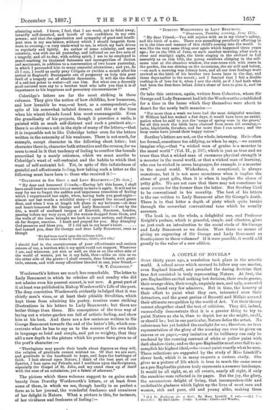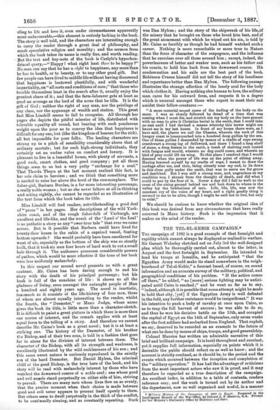A COUPLE OF NOVELS.*
SOME thirty years ago, a revolution took place in the artistic world. A school arose which scorned to follow any one master, even Raphael himself, and preached the daring doctrine that true Art consisted in truly representing Nature. At first, the pre-Raphaelites excited nothing but derision, their crude greens, their orange skies, their rough, ungainly men, and ugly, sorrowful women, found very few admirers. But in time, the honesty of their effort to paint what they saw, interested even their detractors, and the great genius of Rossetti and Millais assured their ultimate recognition by the world of Art. Yet their theory cannot altogether stand the test of criticism. They did, indeed, successfully demonstrate that it is a greater thing to try to paint Nature as she in, than to depict her as she might, could, or should be ; but in one particular, Nature defies the artist. No colourman has yet bottled the sunlight for us ; therefore, no true representation of the glory of the noonday can ever be given on canvas or on paper,—any imitation of its brilliancy can only be rendered by the cunning contrast of white or yellow paint with dark shadow-tints; and so the pre-Raphaelite must ever fail to ac- complish his highest ideal,—he cannot paint exactly what he sees. These reflections are suggested by the study of Miss Linskill's clever book, which is in many respects a carious study. She gives us a picture of life which is true in much the same sense as a pre•Raphaelite picture truly represents a summer landscape. It would be all right, or, at all events, nearly all right, if only the sunshine were reflected in its pages. But the joy, the glory, the unconscious delight of living, that incomprehensible awl undefinable gladness which lights up the lives of most men and women, rich and poor, old and young alike, making them • (I.) /it Exchange for a Soul. By Mary Linskill. 8 vols.—(2.) T is Drernotcr. By Hall thtine. 15015. London Clatto and Winds..
cling to life and love it, even under circumstances apparently most unfavourable,—this element is entirely lacking in the book. The story is well told, and the characters are interesting enough to carry the reader through a great deal of philosophy, and much speculative religion and morality ; and the sermon from which the book takes its name is really fine, and worth reading. •
But the text and key-note of the book is Carlyle's hypochon- driacal query,—" Happy! what right haat thou to be happy I" No man can say that he has a right to happiness, any more than he has to health, or to beauty, or to any other good gift. But few people can have lived to middle life without having discovered that happiness is bestowed plentifully, and with wonderful impartiality, on" all sorts and conditions of men;" that those who trouble themselves least in the search after it, usually enjoy the greatest share of it ; and that the farm-labourer gets at least as good an average as the lord of the acres that he tills. It is the gift of God ; neither the right of any man, nor the privilege of any class, nor the appanage of wealth and station. This great fact Miss Linskill seems to fail to recognise. All through her pages she depicts the pitiful miseries of life, distributed with tolerable equality all round, but bearing with such ponderous weight upon the poor as to convey the idea that happiness is difficult for any one, but (like the kingdom of heaven for the rich), all but impossible for poor folks. The leading characters are strung up to a pitch of sensibility considerably above that of ordinary mortals ; but for such high-strung individuals, they certainly set an undue value on comfort and luxury. It is pleasant to live in a beautiful house, with plenty of servants, a good cook, smart clothes, and good company ; yet all these things seem to us but a very petty "exchange for a soul." That Thorda Theyn at the last moment realised this fact, is her sole claim to heroism ; and we think that something more is needed to raise her above the level of the commonplace. The fisher-girl, Barbara Burdas, is a far more interesting personage, a really noblewoman; but as she never falters at all in thinking and acting rightly, she cannot be regarded as an illustration of the text from which the book takes its title.
Miss Linslcill will find readers, notwithstanding a good deal of" prose" in her pages. Her descriptions of the wild York- shire coast, and of the rough fisher-folk of Yarburgh, are excellent and life-like, and the wreck of the Land o' the Leal' is as pathetic a story as any" ower-true tale" that ever we came across. But is it possible that Barbara could have lived for twenty-four hours in the cabin of a capsized vessel, floating bottom upwards ? She would probably have been smothered for want of air, especially as the bottom of the ship was so stoutly built, that it took six men four hours of hard work to cut a small hole through it. The authoress possesses considerable powers of pathos, which would be more effective if the tone of her book were less uniformly melancholy.
In this respect our second novel presents us with a great contrast. Mr. Caine has been daring enough to end his story with the death of his principal personage ; but his book is full of the sunshine of life it shows us all the gladness of living, even amongst the untaught people of Man a hundred and eighty years ago. The novel is inartistic, inasmuch as it consists of the life-history of four men, three of whom are almost equally interesting to the reader, whilst the fourth, the " Deemster," or Manx Judge, whose name gives the book its title, is little more than a character-sketch. It is difficult to paint a great picture in which there is more than one centre of interest, and the remark applies with at least equal force to the telling of a story. And therefore we cannot describe Mr. Caine's book as a great novel ; but it is at least a striking one. The history of the Deemster, of his brother the Bishop, and of their two sons, is told in a fashion that goes far to atone for the division of interest between them. The character of the Bishop, with all its strength and weakness, is excellently illustrated by the wild recklessness of his son ; and this same sweet nature is curiously reproduced in the saintly son of the hard Deemster. But Daniel Mylrea, the criminal child of the good Bishop, is the true hero of the book, and his story will be read with melancholy interest by those who have watched the downward course of a noble soul ; one whose good and evil angels stand perpetually on either side of him, striving to prevail. There are many men whose lives flow on so evenly, that the precise moment when their choice is made between good and evil never appears to present itself openly to them. Bat others seem to dwell perpetually in the thick of the conflict, to be continually Binning, and as constantly repenting. Such
was Dan Mylrea ; and the story of the shipwreck of his life, of the misery that he brought on those who loved him best, and of
the great atonement with which he wiped out his sin, is told bi- Mr. Caine as forcibly as though he had himself watched such a career. Nothing is more remarkable or more true to Nature than the force of character of the scapegrace, and the influence that be exercises over all those around him ; except, indeed, the powerlessness of better and weaker men, such as his father ant his Cousin, to hold him back from his downward course. His condemnation and his exile are the best part of the book Robinson Crime himself did not tell the story of his lonelinese and repentance better than Dan Mylrea. The following passage illustrates the strange affection of the lonely soul for the body which clothes it. Having nothing else human to love, the solitary man cares for his outward form, and respects it to a degree which is unusual amongst those who expect to meet their end amidst their fellow-creatures A more material sequel came of the finding of the body on the moor. I was so closely followed by dread of a time that was coming when I mast die, and stretch out my body on the bare ground with no man to givet Christian burial i the earth, at I co l
take
no rest until I had devised a means whereby terror might
not
haunt me in my last hours. In front of my hones there were, as I have said, the places we call the Chasms, wherein the rock of this hungry coast is honeycombed into a hundred deep gullies by the sea. One of these gullies I descended by means of a cradle of rope swung overthwart a strong log of driftwood, and there I found a long shelf of stone, a deep fissure in the earth, a tomb of shelving rock coated with fungus and mould, whereto no dog could come, and wherein no bird of prey could lift its wing. To this place I resolved that I would descend when the power of life was on the point of ebbing away. Having lowered myself by my cradle of rope, I meant to draw the cordage after me, and then, being already near my end, to lie down in this close gully under the earth, that was to serve me for grave and deathbed. But I was still a strong man, and, ungracious as my condition was, I shrank from the thought of death, and did wtloiatthI Never could to put by the fear of it. Nev a day did I fail to walk e crest of the rising ground behind me and look down to where in the valley lay the habitations of men. Life, life, life, was now the constant cry of the voice of my heart, and a right goodly thing it seemed to me to be alive, though I might be said not to live, but only to exist."
We should be curious to know whether the original idea of this book was derived from any circumstances that have really occurred in Manx history. Such is the impression that it makes on the mind of the reader.










































 Previous page
Previous page